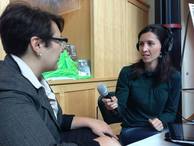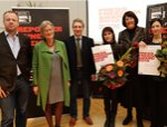- Stanley Tucci: Searching for Italy - Bologna (link)
- SkyTG24 - Good Morning Italia, l'intervento di Alessia Cerantola (link)
- TEDxPadova (link)
- Rif LAB, laboratorio anticorruzione di alta formazione, Genova (link)
- Fake news e obiettività dell'informazione, Università degli Studi di Padova (link)
- Alessia Cerantola: sdoganare il Giappone dalle news (link)
- Panorama - Panama Papers: ecco come sono stati scoperti gli evasori, Panorama (link)
- Alessia, la reporter che racconta il mondo, nòva, Il Sole 24 Ore (link)
- SkyTG24 - Good Morning Italia, l'intervento di Alessia Cerantola (link)
- TEDxPadova (link)
- Rif LAB, laboratorio anticorruzione di alta formazione, Genova (link)
- Fake news e obiettività dell'informazione, Università degli Studi di Padova (link)
- Alessia Cerantola: sdoganare il Giappone dalle news (link)
- Panorama - Panama Papers: ecco come sono stati scoperti gli evasori, Panorama (link)
- Alessia, la reporter che racconta il mondo, nòva, Il Sole 24 Ore (link)

- Lessons from women in leadership in Europe: Speak out, innovate and do your homework, Poynter
(...) 2. Innovate and disrupt when the traditional media model fails you
From Barcelona to Sofia, for every dozen women I know who dropped out of journalism because of a lack of mentors or mindset, or indeed a functioning infrastructure, there is a handful that stand out for making the industry work for them.
The solution to the struggle: you have to set a trail blazing in your local culture.
From her journalism school in Turin, Alessia Cerantola remembers one comment from a tutor; “Newsrooms are places for men; it’s just an excuse for them to stay away from their wives.”
In 2011, the 34-year-old co-founded the first ever investigative journalism centre in Italy, IRPI. It is a partner of the Global Investigative Journalism Network, an association of 107 NGOs in 50 countries. Their last piece, exposing a serial rapist who used “couchsurfing” to secure his victimsweb.archive.org/web/20150326034309/https://www.poynter.org/how-tos/leadership-management/321757/lessons-from-women-in-leadership-in-europe-speak-out-innovate-and-do-your-homework/, was a year-long, nine-country project. It was published in The Guardian and The Sydney Morning Herald amongst others. Continue here.
(...) 2. Innovate and disrupt when the traditional media model fails you
From Barcelona to Sofia, for every dozen women I know who dropped out of journalism because of a lack of mentors or mindset, or indeed a functioning infrastructure, there is a handful that stand out for making the industry work for them.
The solution to the struggle: you have to set a trail blazing in your local culture.
From her journalism school in Turin, Alessia Cerantola remembers one comment from a tutor; “Newsrooms are places for men; it’s just an excuse for them to stay away from their wives.”
In 2011, the 34-year-old co-founded the first ever investigative journalism centre in Italy, IRPI. It is a partner of the Global Investigative Journalism Network, an association of 107 NGOs in 50 countries. Their last piece, exposing a serial rapist who used “couchsurfing” to secure his victimsweb.archive.org/web/20150326034309/https://www.poynter.org/how-tos/leadership-management/321757/lessons-from-women-in-leadership-in-europe-speak-out-innovate-and-do-your-homework/, was a year-long, nine-country project. It was published in The Guardian and The Sydney Morning Herald amongst others. Continue here.
- Why did you get into journalism and would you do it again? Part two (BBC College of journalism)
(...)Alessia Cerantola, reporter at Investigative Reporting Project Italy
I was already 25 when I first felt that I could help fill a small gap in news coverage in my home country, Italy. My degree was in oriental studies, involving several research trips to Japan - a country scarcely covered in Italy. So I started studying journalism and then working almost unpaid as a freelance reporter for national and English language media.
I was able to cover my expenses reporting from Japan - especially after the 2011 Tōhoku earthquake and tsunami and the Fukushima nuclear crisis - thanks to other journalism-related work.
I stayed in the refugee camps, travelling alone on a low budget. Otherwise, only a couple of official correspondents were working there for the Italian media. So, even a single freelancer could make a small difference. Continue here.
(...)Alessia Cerantola, reporter at Investigative Reporting Project Italy
I was already 25 when I first felt that I could help fill a small gap in news coverage in my home country, Italy. My degree was in oriental studies, involving several research trips to Japan - a country scarcely covered in Italy. So I started studying journalism and then working almost unpaid as a freelance reporter for national and English language media.
I was able to cover my expenses reporting from Japan - especially after the 2011 Tōhoku earthquake and tsunami and the Fukushima nuclear crisis - thanks to other journalism-related work.
I stayed in the refugee camps, travelling alone on a low budget. Otherwise, only a couple of official correspondents were working there for the Italian media. So, even a single freelancer could make a small difference. Continue here.
- Abe's tour of Latin America highlights military strategy purpose: Italian expert (Xinhua)
Japanese Prime Minister Shinzo Abe's 11-day tour of Latin American countries highlights military strategy purposes, Alessia Cerantola, cofounder of Investigative Reporting Project Italy (IRPI), an association of investigative journalists based in Italy, told Xinhua on Friday.
"Abe's search for a reshape of Japan's own security identity is one of the reasons behind this trip," Cerantola, a journalist focusing on Japanese issues, said. Continue here.
Japanese Prime Minister Shinzo Abe's 11-day tour of Latin American countries highlights military strategy purposes, Alessia Cerantola, cofounder of Investigative Reporting Project Italy (IRPI), an association of investigative journalists based in Italy, told Xinhua on Friday.
"Abe's search for a reshape of Japan's own security identity is one of the reasons behind this trip," Cerantola, a journalist focusing on Japanese issues, said. Continue here.
- Infoleaks in campo (Nòva, Il Sole24 Ore)
In attesa che anche l’Italia adotti un Foia, un Freedom of information act, e i cittadini possano imparare a esercitare al meglio il loro diritto all’accesso civico, su tutte le informazioni della Pubblica Amministrazione, non mancano campagne e strumenti rivolti a sensibilizzare l’opinione pubblica alla lotta alla corruzione e a favorirne un ruolo attivo.
Da “Riparte il futuro” promossa da Libera, Gruppo Abele, Avviso Pubblico e oltre 500mila cittadini, all’attività di Trasparency Italia che presto lancerà un centralino anticorruzione, fino a Diritto di Sapere che ha promosso la seconda edizione di Legaleaks, manuale per diritto all’accesso per cittadini e giornalisti, primo passo verso il controllo della cosa pubblica e la trasparenza. Continua qui.
In attesa che anche l’Italia adotti un Foia, un Freedom of information act, e i cittadini possano imparare a esercitare al meglio il loro diritto all’accesso civico, su tutte le informazioni della Pubblica Amministrazione, non mancano campagne e strumenti rivolti a sensibilizzare l’opinione pubblica alla lotta alla corruzione e a favorirne un ruolo attivo.
Da “Riparte il futuro” promossa da Libera, Gruppo Abele, Avviso Pubblico e oltre 500mila cittadini, all’attività di Trasparency Italia che presto lancerà un centralino anticorruzione, fino a Diritto di Sapere che ha promosso la seconda edizione di Legaleaks, manuale per diritto all’accesso per cittadini e giornalisti, primo passo verso il controllo della cosa pubblica e la trasparenza. Continua qui.
- Fuga di notizie all’italiana (Internazionale)
Si chiama Irpileaks ed è uno strumento che serve per inviare notizie in modo anonimo ai giornalisti di Irpi, un’agenzia italiana di giornalismo d’inchiesta, nata poco più di un anno fa dall’idea di otto giovani reporter con la passione per le inchieste.
Irpileaks è stata presentata questa mattina ed è la prima piattaforma italiana per “whistleblower”, testimoni di fatti e notizie che hanno bisogno di un canale protetto per inviare segnalazioni anonime alla stampa. Continua qui.
Si chiama Irpileaks ed è uno strumento che serve per inviare notizie in modo anonimo ai giornalisti di Irpi, un’agenzia italiana di giornalismo d’inchiesta, nata poco più di un anno fa dall’idea di otto giovani reporter con la passione per le inchieste.
Irpileaks è stata presentata questa mattina ed è la prima piattaforma italiana per “whistleblower”, testimoni di fatti e notizie che hanno bisogno di un canale protetto per inviare segnalazioni anonime alla stampa. Continua qui.

- Emanuela Zuccalá and Alessia Cerantola are this years’ winners of the "Press Freedom Award- A Signal to Europe" (Reporters Without Borders)
Reporters Without Borders Austria awards this price since 2001. Its aim is to support journalists who work for democracy and the freedom of information. Last year’s award went to Hungarian journalists.
The articles of the winners, Emanuela Zuccalá and Alessia Cerantola, highlight today’s working conditions of Italian journalists. "Alessia Cerontola analyses those difficult conditions, Emanuela Zuccalá chose a parable to point a finger at the abuse of human rights in her country", says Eva Nowotny, member of the jury and president of the Austrian UNESCO commission. Continue here.
Reporters Without Borders Austria awards this price since 2001. Its aim is to support journalists who work for democracy and the freedom of information. Last year’s award went to Hungarian journalists.
The articles of the winners, Emanuela Zuccalá and Alessia Cerantola, highlight today’s working conditions of Italian journalists. "Alessia Cerontola analyses those difficult conditions, Emanuela Zuccalá chose a parable to point a finger at the abuse of human rights in her country", says Eva Nowotny, member of the jury and president of the Austrian UNESCO commission. Continue here.
